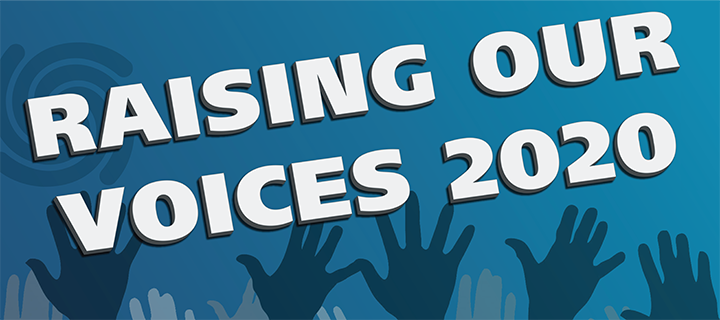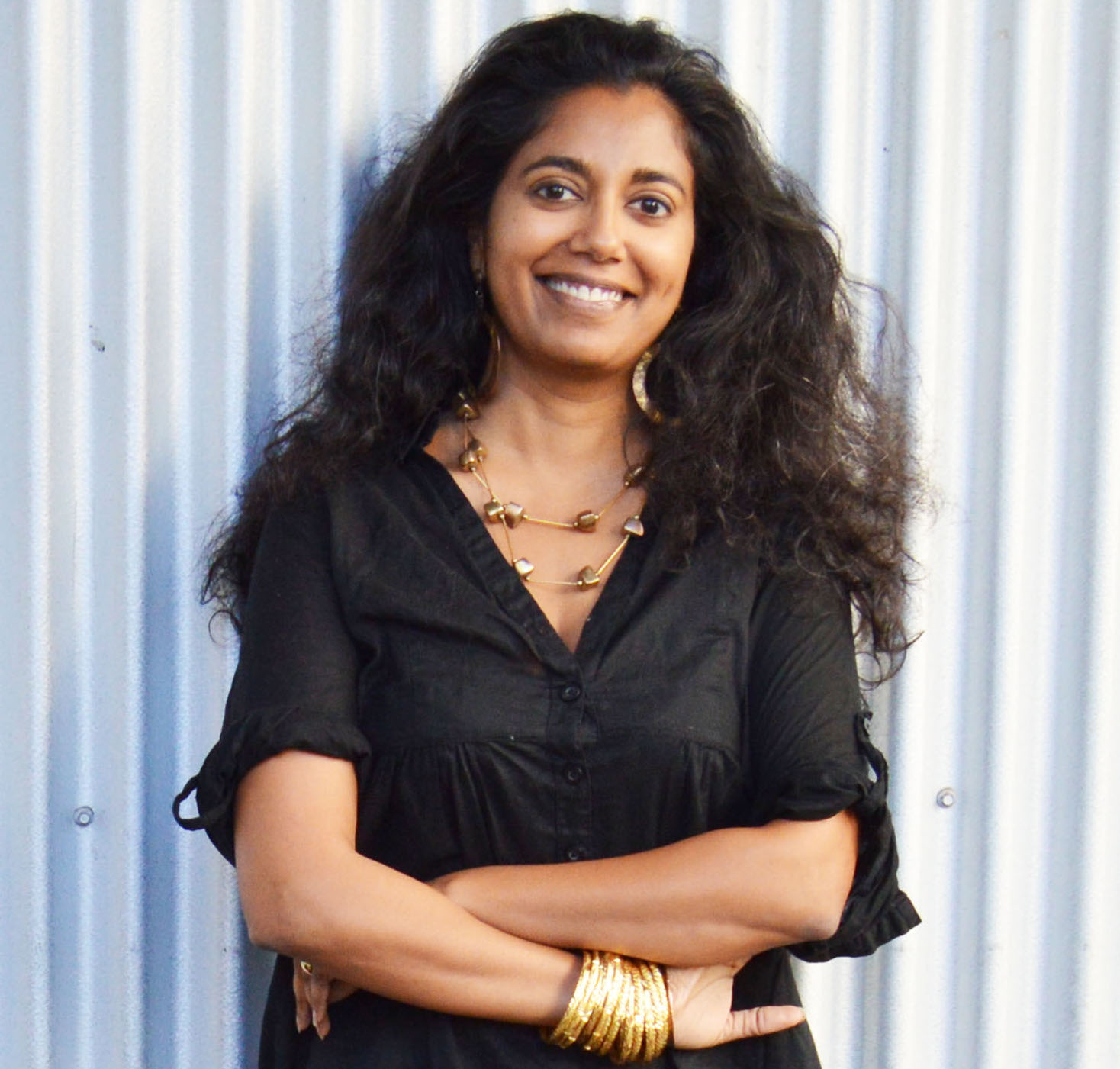Article begins
Raising Our Voices is almost here! A very different and exciting kind of AAA meeting. AN recently talked screen-to-screen with Raising Our Voices program chair Mayanthi L. Fernando about the forthcoming event series and what she is looking forward to. Here are some of the things we discussed.

Image description: A digital graphic with “Raising Our Voices 2020” in uppercase, bold white font against a dark aqua gradient background. To the left and behind the text is the AAA swirl logo in a deeper blue tone. Underneath the text is multiple silhouettes of upraised semi-transparent hands in various skin tones. American Anthropological Association
What are the challenges for creating and innovating an event series at this particular moment, during a pandemic? What possibilities does a virtual event open up?
One of the challenges is that this is all new: the AAA has never done this before. It is an exciting experiment and also means every element needs thinking through. I think that the biggest challenge is really finding ways to come together as a community. We’re so physically isolated and therefore socially isolated also. So one of the things we have really focused on is finding ways to create interactive community, not just coming together in the sense of watching a bunch of stuff on our screen, but also finding ways to meaningfully interact with one another.
What kind of an event series is Raising Our Voices? What formats and forms of interaction will participants be able to engage with?
Raising Our Voices is just a very different kind of event, combining livestream formats and view-on-demand events that are pre-recorded. There are far fewer people actually presenting. And so it’s really about asking, How do we produce something compelling to folks who will not necessarily be presenting themselves? What does the audience want? I think that AAA was absolutely right to make all of the livestream formats conversational rather than presentational, which is the usual, more formal format for the Annual Meeting. So already the folks in roundtables, in conversations, and in interviews in the livestream format will be interacting in a way that is dialogic and conversational. But I wanted something like that for the audience as well, and so we’re going to have virtual hallways. The idea of a virtual hallway was something that we developed for the Society for Cultural Anthropology and Society for Visual Anthropology’s virtual biennial conference Distribute 2020 earlier this year. And I have to say, it was totally amazing in unexpected ways.
I was initially really cautious about the virtual hallway, because I was hearing horror stories from my colleagues about being Zoom-bombed. But it proved a wonderful way to enable people to come together and have conversations during Distribute 2020. And one of the really unexpected pleasures of the virtual hallway was that it radically democratized everyone in the room because everyone was in a small box on Zoom. It felt like people didn’t really do the thing of just deferring to the senior scholars in the room or deferring to the white men in the room. And so it was this really interesting experiment in how that kind of culture, a democratic culture of interaction, could be cultivated.
We are recreating something similar for Raising Our Voices. So after you see a really interesting livestream session on, for instance, the election, and you want to keep talking after the 60 minutes are up, you can go into the designated virtual hallway and that will be open until the next session is over. Basically, each channel will have a designated virtual hallway. It should enable a more interactive virtual space than just watching a session on your screen. And many of the view-on-demand events feature talk-back discussion sessions outside of the livestreamed hours.

Image description: A woman with wavy, dark brown hair past her shoulders stands with her arms crossed and smiles. She wears a black top, gold bracelets, and a necklace.
Caption: Mayanthi L. Fernando. Mayanthi L. Fernando
How did you become involved as program chair?
As part of the organizing team for Distribute 2020, I was the person who liaised with the AAA on that, and so the Association then asked me to bring that experience to Raising Our Voices. But Distribute was a totally collaborative endeavor and there were five of us involved: Paul Christians, E. Gabriel Dattatreyan, Andrea Muehlebach, Arjun Shankar, and me. Any lessons learned from Distribute that I have brought to Raising Our Voices were lessons that we all learned together, and I’m really grateful for that experience.
What are your motivations, aims, and hopes for Raising Our Voices?
My aim is to make anthropology more and more inclusive and accessible. And I think that Raising Our Voices, with its virtual and interactive formats and the AAA’s commitment to accessibility, enables different constituencies to come to the table. Already there are panels with folks who have never registered for the AAA, never been to an in-person place-based Annual Meeting—people from outside of the United States or nonanthropologists, not just scholars but also activists or performers or writers.
One of the things that I’m really excited about is that two of the sessions—one is a session that I curated and one is a session that was volunteered—are bilingual sessions, since Zoom has the technological capability to do simultaneous language interpretation. We’re still nailing down the details, but essentially, the presenters will be speaking in both English and Spanish, and the audience will be able to pick a language channel and listen to the Spanish in English and vice versa. That’s super exciting and much more difficult to achieve with an in-person conference.
I’m also hoping we create community among anthropologists, especially given the timing of all of this. This could be an opportunity for folks to come together and find each other in this moment of crisis—a global pandemic, a political crisis, and an ecological crisis. I’m hoping that people find it productive and comforting, frankly, to come together.
I think that Raising Our Voices, with its virtual and interactive formats and the AAA’s commitment to accessibility, enables different constituencies to come to the table.
Those are my two big hopes for the event series. As part of that, I’m also hoping that Raising Our Voices might create conversations about the content and form that anthropology takes, and that it might take anthropology in some new directions in terms of who is included within the umbrella of anthropology, what we mean by anthropology, and who we think we’re speaking and writing for (who our audience is).
On a more basic level, I’d like to see a successful event for all participants so that some kind of hybrid model of virtual and in-person or place-based conferencing can move forward. There are lots of models on the table now, and there’s going to be a session on the final Saturday, precisely about accessibility, sustainability, and the future of professional meetings. Rather than thinking of this moment only in terms of loss, I think we should take it as an opportunity to ask ourselves what kind of professional meetings we want for the future. If Raising Our Voices goes well, it will offer yet another model of sustainable, carbon conscious, accessible, inclusive, and forward-thinking conferencing.
Mayanthi L. Fernando is associate professor of anthropology and director of the Center for Cultural Studies at the University of California, Santa Cruz.
Cite as: Fernando, Mayanthi L. 2020. “Raising Our Voices in 2020.” Anthropology News website, October 26, 2020. DOI: 10.14506/AN.1523

